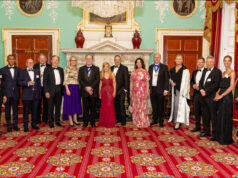Last Wednesday, the South African Chamber of Commerce hosted a webinar moderated by Andrew Skipper of Hogan Lovells, featuring Kuseni Dlamini, Jean Craven, Dirk van den Berg and Mulalo Madula to discuss global supply chains, and Africa’s opportunities post Covid-19, especially in the light of the AfCFTA agreement.
We are very grateful to the four panellists, who were really refreshing. Their diversity of knowledge gave us a four very different lenses through which to view their insights into the issues under discussion.
The focus of the discussion was on how the African Continental Free Trade Agreement might enable greater African integration into the global supply chains for many agricultural, manufactured, mined and other products. The conversation also addressed the focus and role of the UK, post Brexit, in terms of investment and imports from and exports to Africa.
We learnt how Africa is not the easiest destination to do business with – South Africa ranking only in the 80s out of 140 countries, compared to the UK’s ranking of 8th easiest. Deep insights were shared into the complications of government and private sector working together effectively to create an investment-friendly environment. Watch the webinar below to hear about the various solutions the panel discussed.
We heard from Kuseni, Chairman of the home grown global company, how Aspen’s Port Elizabeth plant won manufacturing contracts for COVID-19 vaccines for J&J, which will create a direct contribution to global supply chains. He emphasised how the diversification of supply chains in this way was a direct outcome of the Covid-19 pandemic, and part of a wider strategy to build resilience into supply chains, as well as to develop local industrial capacity.
Tariff barriers are always a challenge for governments to deal with, as they attempt to balance a desire to protect local interests against the risks of inhibiting trade. As a consequence of the AfCFTA, African countries are aiming to reduce the existing barriers, linearly over time, to further enhance the ease of trading within Africa and, importantly, globally. The panel emphasised that attracting finance for African projects needs security, trust, stability and a corruption free private and government environment.
As is the case globally, the Covid-19 pandemic has created opportunities and risks, innovation and creativity, for Africa; it has hastened scientific research, accelerated product to market timelines, and rewarded responsive businesses who have been able to fill gaps created by less agile or more isolated economies.
Watch the recording below:
You can find recordings of all our previous webinars on our website, here.
You’ll also find details of all our upcoming events here, and if you’re not already a member of the Chamber, options for how to join the South African Chamber of Commerce UK here. If you have any questions about membership, you’re very welcome to contact us and we’ll be delighted to help.











